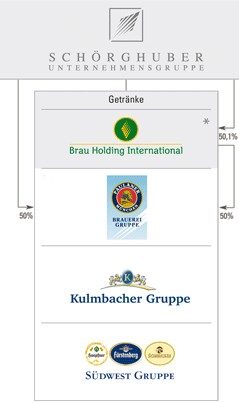Paulaner to build a new brewery – perhaps
Not bad. Despite the German beer market declining 2 percent in 2010, Brau Holding International (BHI), the joint venture between Heineken and Germany’s Schörghuber Group which owns Paulaner brewery, managed to raise turnover and volumes. Sales were up 1.4 percent to EUR 576 million while output increased 2 percent year-on-year, it was reported.
According to BRAUWELT International’s estimates, BHI sold 4.4 million hl beer in 2010 and ranked as Germany number six brewing group.
However, when it comes to profits (EBIT), BHI’s executives must have been crying into their beers: only EUR 21.9 million which translates into an EBIT margin of 3.8 percent.
That’s the kind of profitability for which other global brewers would not get out of their beds in the morning, to quote super model Naomi Campbell. But that’s Germany for you. In a market as highly fragmented as Germany’s, margins are nothing much to write home about, unfortunately.
Still, at BHI’s press conference in June 2011, Schörghuber’s CEO Klaus Naeve said that Paulaner was mulling over relocating part or all of its Paulaner brewery which sits squarely in Munich’s inner city. The decision will be taken this year.
Although Paulaner could do with more capacity – its Paulaner export volume is supposed to double to 1.5 million hl by 2015 from currently 855,000 hl – the conclusion as to whether to move or to stay, ultimately, will be real estate driven. As we have argued before, the value of a brewery is the value of the land it occupies. Paulaner’s current brewery occupies 60,000 sqm of highly valuable real estate.
Where could Paulaner move to? As it happens, a member of Schörghuber’s supervisory board, Jobst Kayser-Eichberg, managed to secure a piece of land on Munich’s western outskirts which could be turned into the site of the new Paulaner brewery or, if that proves too costly, its new logistics centre.
Interestingly, Mr Kayser-Eichberg had originally earmarked the site for the new Spaten-Löwenbräu brewery. Being the former owner of the Spaten-Löwenbräu brewery, he had hoped that AB-InBev, which bought his beer brands (but not the brewery!) in 2004, would vacate the Spaten-Löwenbräu site so that he could turn the 70,000 sqm plot of land into flats and offices. But AB-InBev decided to stay in the centre of town even though that means that AB-InBev will see its rent increase significantly.
Perhaps Paulaner will help Mr Kayser-Eichberg out of a glitch and move to his out-of-town location, which has the benefit of excellent connections to the road network, while still being within Munich’s boundaries. This is of major importance for a brewery that wants to be called a Munich brewery and sell its beer at the Munich Oktoberfest. According to the Oktoberfest’s statutes, only Munich breweries are entitled to participation.
At the end of the day, the fate of the Paulaner brewery rests with its majority shareholder Schörghuber Group and its parent’s ability to spend big time. A new brewery could cost Paulaner in excess of EUR 300 million excluding the land. Does Schörghuber have this sort of money? Besides, will Heineken be willing to throw in its share given BHI’s meagre profits?
Don’t hold your breath.


